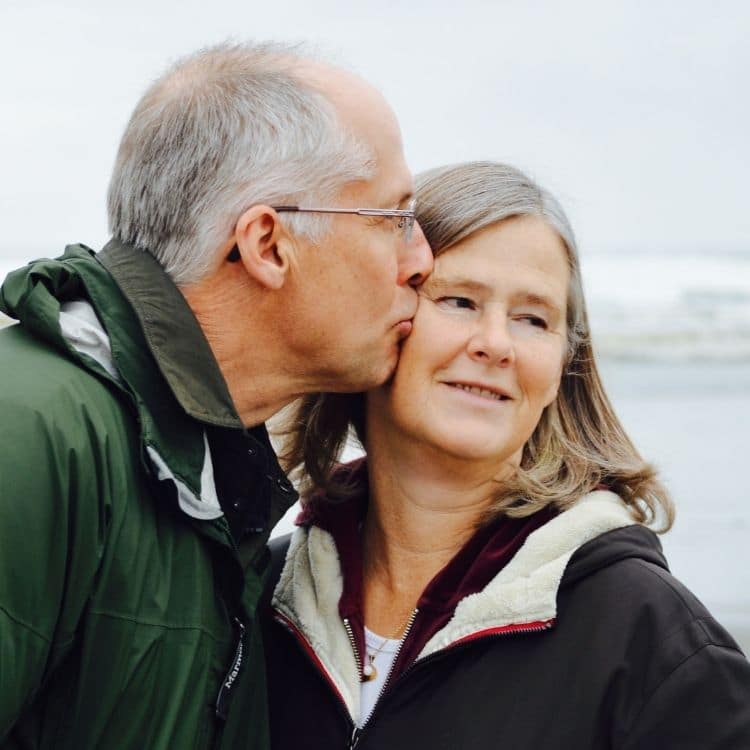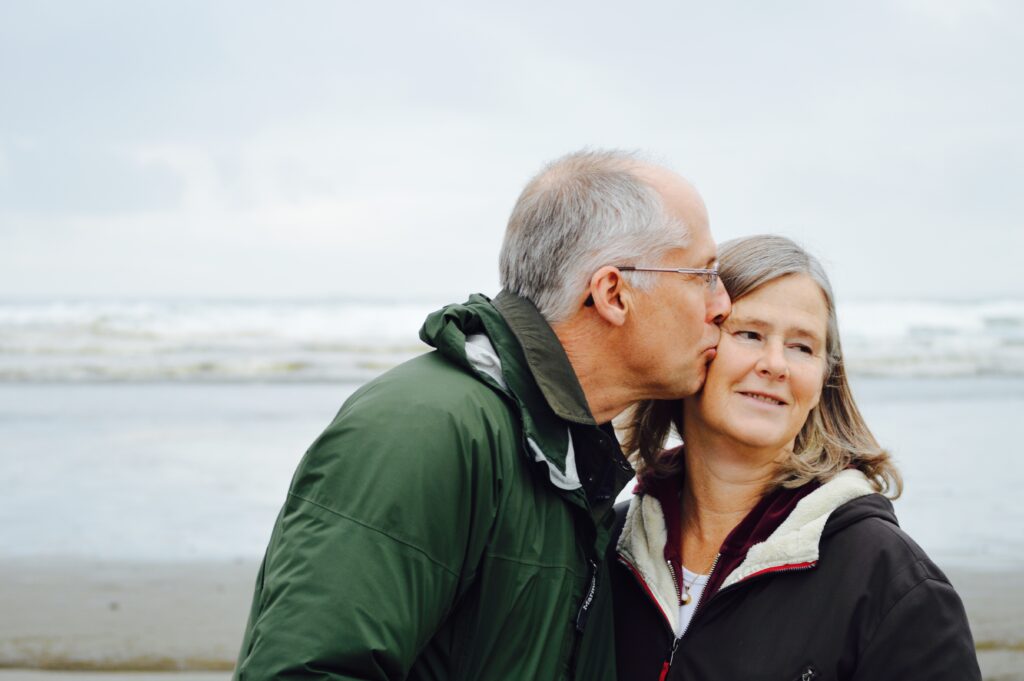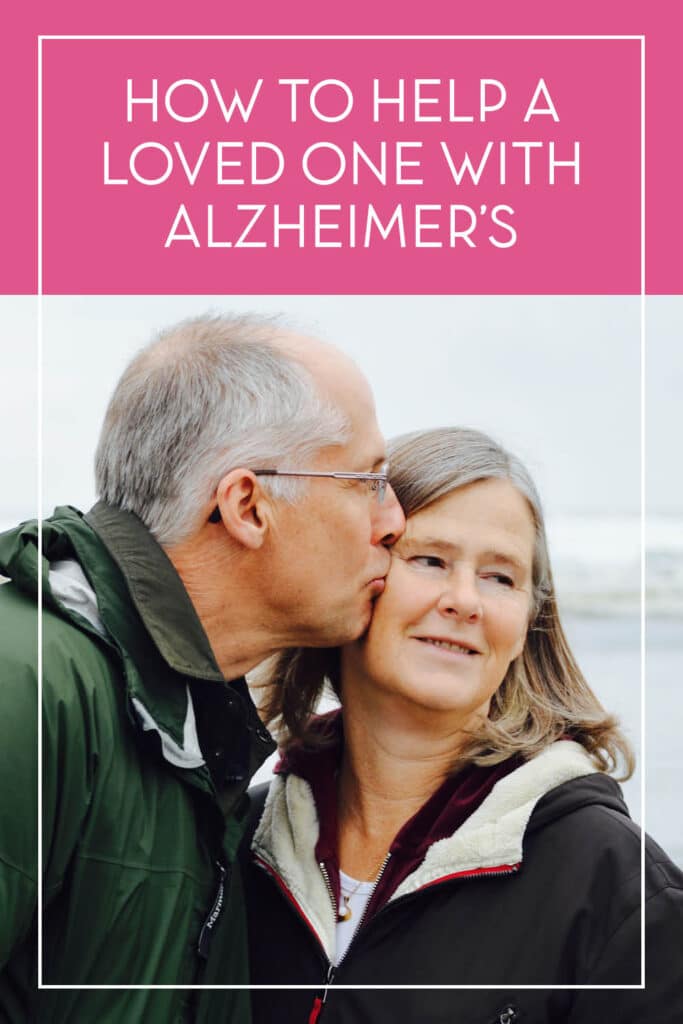Knowing how to help a loved one with Alzheimer’s (which is a form of a dementia), or even one who is just beginning to exhibit symptoms, can be so overwhelming. If you’re just beginning this journey, you probably have so many questions — how can I help my loved one experiencing Alzheimer’s symptoms? What does Alzheimer’s care look like? Where do I start? How can we get them diagnosed? Thankfully, so many of these questions were answered in your responses. While we can’t personally vouch for all of these ideas, we hope that this post gives you a jumping-off point for some ways to help your loved one struggling with Alzheimer’s, dementia, or memory loss. Just click on the links below to be taken to the associated section where we’re exclusively sharing the advice all of our Instagram and Facebook followers shared with us.
Where to StartHelpful IdeasResources
Where to Start When Seeing Signs & Symptoms of Alzheimer’s
“I would look at Brain and Spine on Instagram if your relative is here in Utah. I go there not for this issue, but if you look at all their stories, there are some on the brain and treatments they do. I know you like the more homeopathic route so I thought you would be interested.”
“I recommend, if you are struggling to get a diagnosis, to take them to a university because they are so much more knowledgeable, especially if it’s a rare form of dementia. Personality and behavioral changes are usually a sign of front temporal dementia, whereas as forgetfulness and short term memory is associated with Alzheimer’s. Having the right diagnosis helps a lot. There are also Alzheimer’s care organizations that can help you with resources for caregiving, support groups, workshops, etc.”“Google ‘memory care’ + your city. We didn’t learn the phrase ‘memory care’ until we were right where you are. There are also support groups for family members.”“A neurologist! You can start with a PCP who will most likely give you a referral to a neurologist who will do the testing to help determine the diagnosis. If you can, see a geriatric psychiatrist. They seem to be the most helpful.”“Their doc can do some cognitive testing and an MRI to see the disease’s level of progression. Check out the memory clinic too if you have one. They have meds that can slow the progress. Not a cure but it’s something.”“Make an appointment for an intake evaluation with a neuropsychiatrist or memory clinic at the largest hospital nearby. There are different types of dementia and reasons for cognitive decline. I’m an SLP and often get orders to evaluate cognition when someone gets admitted. Therapy can help with compensatory memory strategies to preserve independence (as well as help you to implement any necessary environmental modifications), but the diagnosis is helpful to establish an appropriate treatment path.”“Alzheimer’s and dementia has been named as Type 3 Diabetes. Going to a neurologist is a good start but also finding a local functional medicine doctor would be BEST. ifm.org is a good resource also if you can start having them cut out sugar, seed oils, and processed food. Those items right there create insulin resistance and it causes inflammation in the brain and that’s how dementia and Alzheimer’s start. Since it’s in the beginning stages, you might be able to reverse it by changing their diet. I can find more resources if you would like on how to find a functional med doctor.”“My mom went with my dad to his doctor and let the doctor know all the changes that she has seen in him to get a baseline to then be sent on to a specialist. There is no one-size-fits-all because the disease affects everyone differently, so the family is most important in early diagnosis.”“If the person doesn’t think they have a problem and can fake their way through a 30-minute conversation pretty well, then I would suggest calling the doctor’s office in advance and giving them a heads up.”“It can be very difficult (and it can take a long time) to get a diagnosis. Patience but persistence during the process is key. Explain ALL the things you have noticed (keep detailed notes) to their doctor and be persistent that you want a memory care doctor to do a full examination and memory test.”
Helpful Ideas to Help With Staging Alzheimer’s
“Make sure they are staying hydrated! This is something most people don’t think much about in all the other concerns. Any way you can get real water into them helps!”“Make sure to check for a UTI, and potentially have them start taking lion’s mane mushroom supplements. Also check for elevated liver enzymes and parasitic worms, both of which can cause memory loss.”
“Once a diagnosis is given, they have soooo many classes and support groups to help educate you on Alzheimer’s care — and they are also a place to grieve and vent.”
“Remember that when it’s frustrating, your loved one is not trying to be frustrating — it’s just the course of disease. They likely have no clue when they are repeating themselves, so always act as if it’s the first time you’ve heard it to avoid confusing them even further. If they are truly losing their memory, they begin to live in their own reality and arguing just agitates them.”“Ask your primary care provider for resources and options for in-home care until your loved one need round-the-clock care. That way you have a few options on hand so you’re not making decisions rapidly and emotionally.”“The biggest way to support them is to educate yourself and your family. Accepting it first, and then learning all that you can. Support groups are great. Each person is different, so hearing how others dealt with the transition was really helpful for me. I, along with some family members, really needed to grieve. It’s a different type of loss, but a loss of the person that you knew. That was difficult. Also, accepting when you need help from other people. As things progress, enjoy the time you have and just spend time loving them and accept care from professionals. THERE IS HOPE! It can be devastating, but it can be treated as well.”“It’s essential with Alzheimer’s care to make sure the Power Of Attorney for financial and medical is very trusted by the family, as well as wise and fair.”“Keto diet/low carb helped one of my elderly family members immensely! It helped so much with the encroaching brain fog and other symptoms. Research how dementia and Alzheimer’s are starting to be considered a third form of diabetes. My daughter is a Type 1 diabetic and we have learned so much in the last six years about how blood sugars play such a huge part in brain function. Removing high carb is extremely important.”
“Be more present, but also make sure that the person with this illness gets plenty of stimulation both intellectually and physically. You’ll be tempted to help them walk or sit or do whatever, but try to restrain yourself and let them slowly figure things out while you are still in the background — basically like you would do with your kids while they learn everything in life.”“If your loved one is in a relationship, the partner needs moments where they don’t have to deal with the illness, so make sure to care for them and give them moments of rest too.”“Keep a journal of the memories they share!”“Look up the effects of caffeine to help them keep their memory. My mom is a psychologist and she said caffeine is supposed to help.”“Detoxing heavy metals is crucial in reversing memory loss!”“My grandma has undiagnosed Alzheimer’s. She is forgetting a lot of things and people, and she feels lonely because she doesn’t remember anyone visiting her. It’s helped her to have photo albums with people’s names. She loves to look through the pictures we put in the book. Any photos are great. It helps her feel connected and she recognizes us from the books so we aren’t strangers.”“My neighbors dealt with this. She moved into a facility where part is a home for people with dementia, and part is apartments. She lives in an apartment down the hall from her husband (who has dementia) so she can be with him whenever she wants, but then has the help to keep him safe. She has her own apartment so she can come and go as she pleases. I just talked to her and she loves it. She doesn’t have the full stress of taking care of him alone but still gets to be with him.”“You may need to address the issue of driving at some point for their safety and the safety of those on the road. The person can be referred to the DMV for a retest by a provider so the family does not have to be the bad guy.”“Make laminated cards with things they like to do, eat, and drink labeled with the words.”“Get them brain puzzles if you are catching it early. Puzzles, sudoku, crosswords, word puzzles. Things to make their brain process information they know and work. Seems to help slow the disease down.”“Everything I’ve heard/seen shows that music is really important for people who have Alzheimer’s. My grandma had dementia and she LOVED singing and music. It literally like brings them back — they act like they did when they heard that music in the past. It’s pretty cool.”“For Alzheimer’s care or dementia], it can be helpful (if your loved one is up for it) to go back and read thoughts and memories, but in their own handwriting so it helps them connect that the memories and experiences are ‘theirs’ instead of just hearing things from people that they may or may not believe.”“CNA here; I deal with this on the daily. The most important thing is to know them and let them know you are there. They often use words or replacement for what they are wanting. It’s SO much better for them if you can let them/help them do things on their own. It really boosts morale.”“Regarding Alzheimer’s care, if they are happy and they think it’s 1950 again, go with it. I remember when I worked as a nurse, I had a patient who thought she was at a military hospital. She was happy so I went with it! I’m going to try and DM you something I saw that explains this. It’s helpful:“‘How do I answer my dad with dementia when he talks about his mom and dad being alive? Do I go along with it or tell him they have passed away?’ PhD Psychologist response: ‘Enter into his reality and enjoy it. He doesn’t need to be ‘oriented.’ Thank God the days are gone when people with advanced dementia were tortured by huge calendars and reminder signs and loved ones were urged to ‘orient’ them to some boring current ‘reality.’ If dad spends most of his time in 1959, sit with him. Ask questions he didn’t have time for before. Ask about people long dead, but alive to him; learn, celebrate your heritage. His parents are alive to him. Learn more about your grandparents. If he tells the same story over and over, appreciate it as if it’s music, and you keep coming back to the beautiful refrain. This isn’t ‘playing along to pacify the old guy,’ this is an opportunity to communicate and treasure memories real but out of time.’”“Some people say that organic virgin coconut oil eaten daily (cook your eggs in it, put it in your coffee, etc.) has actually reversed their loved ones’ memory loss problems and got them back to their old selves again.”“There are some vitamins and minerals (especially B-12) that, when lacking, can cause memory loss.”
Resources For Early Signs of Alzheimer’s
The 36-Hour Day: A Family Guide to Caring for People Who Have Alzheimer Disease, Related Dementias, and Memory Loss by Nancy L. Mace, MA and Peter V. Rabins, MD MPHThe End of Alzheimer’s: The First Program to Prevent and Reverse Cognitive Decline by Dale BredesenCreating Moments of Joy Along the Alzheimer’s Journey: A Guide for Families and Caregivers by Jolene BrackeyDementia: The Journey Ahead — A Practical Guide for In-Home Caregivers by Susan Scarff and Ann ZultnerLearning to Speak Alzheimers: A Revolutionary Approach to Living Positively with Alzheimer’s Disease by Joanne Koenig-Coste“A university in Ohio has a test that you can print out and do and if you are concerned, and you can take it to the doctor. It’s called the SAGE test and takes approximately 15 minutes.”“I used to work inpatient on a memory care unit and we did a test called the “MoCA” test. It helps tell the doctors where the persons cognitive and memory function are. I am not sure if they still use it, but it might be worth it to ask your loved one’s doctor if they do that test!”Alzheimer’s Foundation of AmericaAlzheimer’s Association
“Have you heard of Dr. Daniel Amen and the Amen clinics? They do a brain scan so you can see the problem areas. He believes you can change your brain. I attended a Zoom class that I found through Facebook, and it was very encouraging.”“There’s a documentary called Alive Inside that goes into a really amazing music therapy that they use in many memory care facilities now and it makes a big, big difference for those with dementia and Alzheimer’s.”“We got her this clock. One for the bedroom and one in the living room. It shows everything and is big enough she can see it. It has helped so much for her to keep track of her days.”This company “A Mind For All Seasons” in Boise is trying something revolutionary and new. They have done studies on studies on this subject, and they do a lot for the community and retirement homes. I know people come from all over the country to get help for Alzheimer’s and dementia. Eric Collett, the director, is super kind and I guarantee would give you hope for your loved one!”“Check out Memory Matters, a non-profit dedicated to educating families on dementia AND providing helpers for those family members.”“Dr. Caroline Leaf has a very good podcast about [Alzheimer’s care] and gut health that might be helpful.”“Look up Teepa Snow. She has some very good educational videos that hopefully can help!”
Signs and Symptoms of Alzheimer’s
As your loved one gets older, he or she may start to exhibit some new behaviors — forgetfulness, fatigue, poor sight and hearing, etc. Because these things are relatively normal as one ages, it can be difficult to know what is and is not a sign of Alzheimer’s or dementia. (Alzheimer’s Assocation’s website does a great job of showcasing the difference between normal age-related changes versus Alzheimer’s symptoms, and we’d urge you to visit their website for more in-depth information!) We’ll summarize the early signs and symptoms they say to be on the lookout for in a loved one you believe may have Alzheimer’s:
Difficulty coming up with the right words or names for thingsPoor/decreased judgmentMemory issues/loss that disrupts daily lifeConfusion regarding time and/or placeMisplacing or losing objectsDifficulty solving problemsStruggling to complete routine, familiar tasksWithdrawing from work and social eventsHaving trouble understanding spatial relationships
If your loved one is displaying any of these symptoms, schedule an appointment with a doctor. Alzheimer’s Association’s website explains, “With early detection, you can explore treatments that may provide some relief of symptoms and help you maintain a level of independence longer, as well as increase your chances of participating in clinical drug trials that help advance research.”
What Is the Difference between Alzheimer’s and Dementia?
While some people use the terms “Alzheimer’s” and “dementia” interchangeably, there’s actually a significant difference. Dementia is the term used to describe a specific group of brain disorders (including Alzheimer’s) or symptoms that affect daily life. These symptoms include difficulty remembering things, thinking clearly, and judging rationally. Alzheimer’s, a degenerative brain disease, is the most common form of dementia. It typically affects those 65 and older, and is considered early onset if it affects someone under the age of 65. It is a progressive disease, meaning it worsens with time (which is why it’s best if you can catch it early). While there is currently no cure for Alzheimer’s, there are SO many things you can do to make your loved one’s Alzheimer’s experience a little more comfortable. Alzheimer’s care can be taxing, especially during the beginning stages when you’re trying to figure things out. We hope that these ideas and answers to some frequently asked questions can provide you comfort during a time that can be so difficult, heartbreaking, and confusing. We wish you and your loved one with dementia all the best as you move forward in your journey — and pray that you know you are NEVER alone! Let us know in the comments down below if you have any additional advice that might be helpful for those in this situation!





